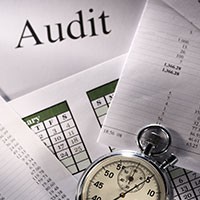Last updated: October 03 2017
What Do You Do If You’re Audited by the CRA?

The Canada Revenue Agency completed nearly 112,000 audits during fiscal 2016-17, according to a government report on recent efforts to crack down on tax cheats. If you or your clients are chosen for an audit, there are a few best practices that can help you through the process.
The federal government’s ramped-up campaign to combat tax evasion and aggressive tax avoidance is being funded by historic investments of close to $1 billion in Budget 2016 and 2017. Highlights of the preliminary results shared by the CRA, from April 1, 2016, through March 31, 2017, include:
- 335 cases referred for criminal investigations
- 123 search warrants executed
- 32 criminal charges laid under the Income Tax Act, Excise Tax Act and/or the Criminal Code
- 37 convictions
- $10 million in court fines and 50.6 years of jail time
- 111,712 audits completed
- $12.5B in fiscal impact
Most individuals and businesses file timely returns and follow Canadian tax laws, policies and regulations while using acceptable practices to reduce taxes payable. However, a tax return may be selected for review at any time. According to CRA, an audit is the examination of books and records to accurately determine the taxes, interest and penalties payable under the law.
Here’s what you need to know about the audit process, and a few best practices that can help you in your dealings with CRA:
-
A CRA auditor will write to (and may also call) the individual or business to begin the audit process and provide details on where the audit will take place.
-
Be sure to reply promptly and ask what the audit is about and when it will begin. Ensure all the relevant advisors — accountant, bookkeeper, etc. — are well informed.
- An auditor will analyze books and records, documents and information. The business or individual should ensure the following documents are well organized, updated, and readily accessible:
o Records such as ledgers, journals, invoices, receipts, contracts, bank statements, financing documents and credit card statements
o Tax returns previously filed and supporting documentation or database information (including asset management) and adjustments made by the bookkeeper or accountant to arrive at income for tax purposes
-
Reply to legitimate requests for more information as soon as possible
-
Understand your rights when dealing with the CRA, as defined in the Taxpayer Bill of Rights
-
Keep communications with CRA respectful and ongoing
There is no way to guarantee that an individual or business will never be subject to an audit, but the following steps may help you stay off the CRA’s radar screen:
-
Avoid taking unusually high deductions, write-offs or credits
-
Unless it is really the case, do not declare much lower income than in earlier years
-
Refrain from claiming excessive tax shelters or entering into arrangements deliberately designed to get around tax laws
-
Support all deductions with valid documentation
- If you are self-employed or own your own business:
o Do not report too many expenses and very low revenues, unless this reflects the true situation
o Be careful when claiming a vehicle for business purposes; keep comprehensive records to prove usage
o Take reasonable home-office deductions
o Be vigilant about claiming repetitive and ongoing losses from rental properties, these can raise red flags
Sooner or later businesses or individuals may need to deal with complex tax issues. If you are unsure about tax matters or the treatment of certain transactions, seek professional advice and contact CRA.
The above article was sourced with material from the Canada Revenue Agency.
John Tucciarone, CPA, CMA, is a financial professional, presenter, educator and writer. He is also active with the Chartered Professional Accountants of Canada (CPA Canada) Financial Literacy Volunteer Program
Additional Educational Resources:
DFA-Tax Services Specialist™ designation program
DFA-Bookkeeping Services Specialist™ designation program
MFA-Business Services Specialist™ designation program
©2017 Knowledge Bureau Inc. All Rights Reserved.





